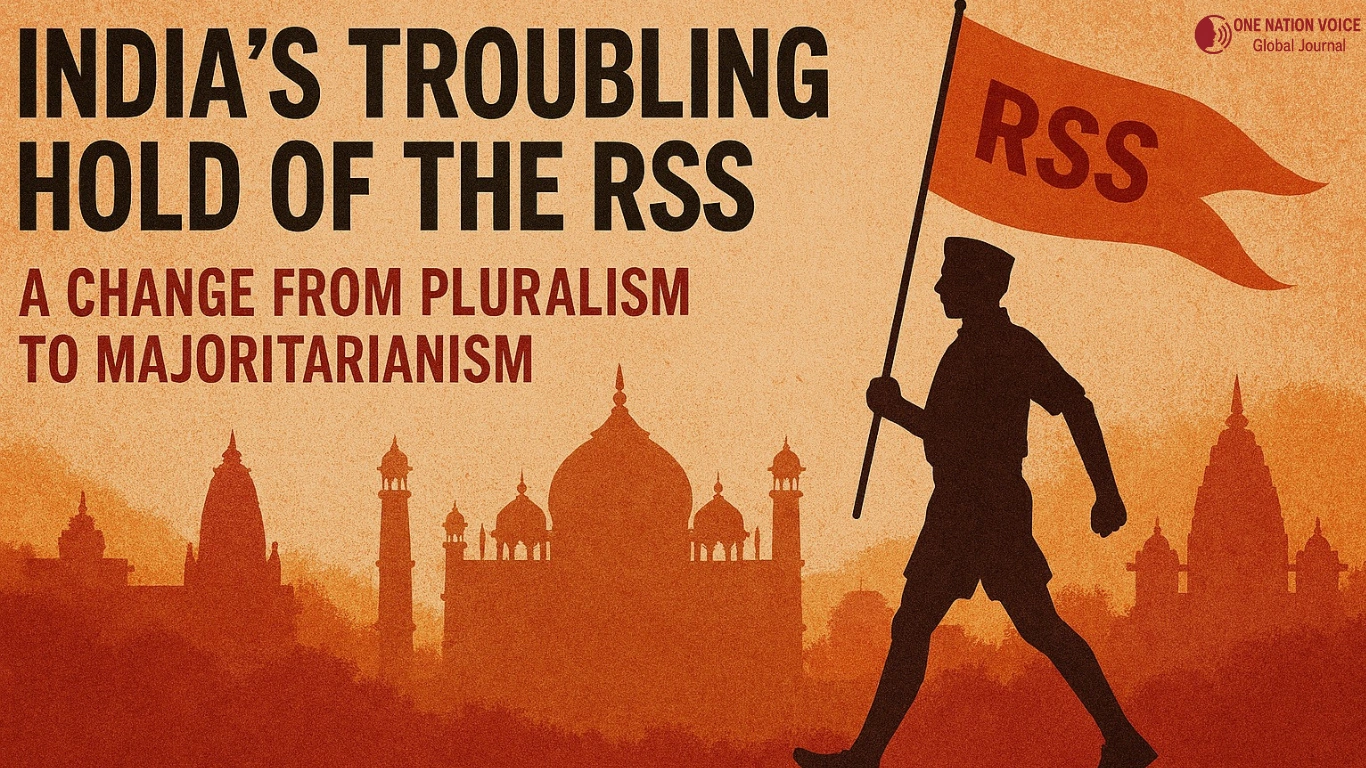India’s Troubling Hold of the RSS

India’s Troubling Hold of the RSS
A Change from Pluralism to Majoritarianism
Indian Prime Minister Narendra Modi publicly revered the Rashtriya Swayamsevak Sangh (RSS), affirming that it is the largest nongovernmental organization in the world and has been active for a century. However, Many spectators are shocked by Modi’s acclamation of the RSS. RSS is not just a harmless cultural organization, but its strategies and principles have come under fire for cheering exclusive nationalism. Moreover, Critics strongly challenge India’s commitment to its core values of diversity and human rights. They argue that the RSS fosters intolerance and has been linked to acts of violence against religious and cultural minorities.
The RSS Ideology and Legacy of Violence
The admiration of Modi for RSS must be understood in the context of the group’s argumentative history and moral goals. Over the past century the activities of RSS have often been categorized by violence, hate speech, and division rather than being a symbol of nonviolent dedication. Furthermore, during its history, it has contributed in public uprisings against Sikhs, Muslims, Christians, and Dalits groups that are essential to India’s mixed society. Notably, India’s lawful promise of secularism is openly at chances with the ideology of groups, which sponsors violent form of majoritarian patriotism that sidelines minority identities. Consequently, the RSS agenda has helped to regulate regular repression of minorities and raise an atmosphere of fear. Therefore, the support of Modi’s creates it obvious that the government supports terrorist organizations that threaten social cohesiveness and interior constancy in India.

Erosion of India’s Pluralistic Democracy
The chief political office’s celebration of the RSS signifies a superior philosophical shift away from India’s inclusive democracy model and towards majoritarian power.
Modi’s acclamation of the group discloses a damaging storyline in which the rights and voices of minorities are being progressively quieted.
Furthermore, this change has an impact on law execution and policy assessments, where the interests of minority communities are often ignored or marginalized. The human rights situation of India has become poorer at the same time of this ideological shift. The ultimately, the increasing power of the RSS encourages a situation where hate crimes and vigilante justice are committed with upsetting regularity and little accountability.
Impact on Social Cohesion and Internal Stability
The diverse agenda of RSS has seriously threatened India’s social cohesion. The ideological descriptions spread by the RSS, and its associates have been linked to violent outbreaks and extensive communal tensions. This point turns counter to the government’s declaration that the RSS brings peace and devotion. As a substitute, the activities of this group have initiated India’s multicultural society to become unbalanced on several occasions. Due to normalization of bias and hate speech, Indian society is deeply divided. This trend, which splits people along religious and ethnic lines, exposes the basis of India’s democracy. India is destabilized both nationally and internationally as a sign of nonspiritual democracy because of this disintegration.
Internal Repercussions and Human Rights Concerns
India had been criticized by international human rights organizations and other governments for its increasing adherence to radical ideologies signified by the RSS.
International viewers worry that India is moving towards dictatorship under the semblance of majoritarian nationalism.
The commendation of RSS accords with India’s growing separation on the international scene because of its deteriorating human rights record. A risky connection between state authority and terrorist ideologies is showed by the government’s unspoken support of groups charged with obligating acts of violence and hate. This places India’s pluralistic image in danger and postures major fears to regional peace and stability, chiefly in a region as varied and geopolitically subtle as South Asia.

Regaining Inclusive Democracy
India wants to review its provision for the RSS and recurrence its promise to pluralism and human rights in order to discourse these critical problems. This requires a categorical social and political refusal of violent beliefs and exclusionary patriotism. The government must inspire genuine dialogue and implement laws that sustain the rights of minorities. Significant actions include protecting rebel opinions, and assuring liability for hate crimes. Multiplicity is not the equality imposed by powerful Majoritarianism, it is what a flourishing, democratic India is all about. Renovating India’s constitution will help in stitching rifts and rebuilding intercommunal trust. A move away from political discourse that promotes groups associated with communal violence is equally vital. Somewhat, the prominence should be on bringing people together around common democratic principles that defend everyone’s freedoms, regardless of caste, religion, or ethnicity. These initiatives will reinforce India’s stability and its standing as a pluralistic democracy around the world.

The disturbing ideological shift in India from a different, inclusive democracy to violent majoritarianism focused by extremist agendas is exposed by Prime Minister Modi’s sustenance of the RSS.
The RSS legacy is not one of peaceful devotion but rather of hatred, communal violence, and division, all of which unceasingly threaten India’s human rights record and social cohesiveness.
India faces international isolation because of this alliance, which also endangers the country’s secular fabric. India must heroically reject exclusionary nationalism and repeat its promise to pluralism, justice, and equality if it is to support its founding values. India can only positively exchange its difficulties and create a future characterized by peace and democratic flexibility by reestablishing balance, protecting minorities, and nurturing unity. The world closely monitors India’s next moves, which will regulate its identity and position in a world order that is changing quickly.
Disclaimer:
The views and opinions expressed in this article are exclusively those of the author and do not reflect the official stance, policies, or perspectives of the Platform.












